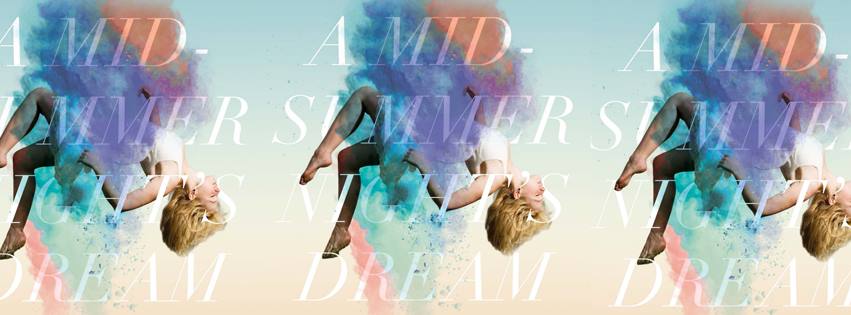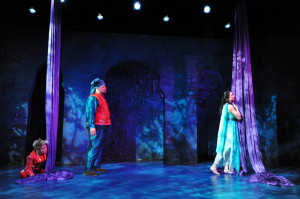
In conjunction with its magical, colorful, critically acclaimed production of A MIDSUMMER NIGHT’S DREAM, the Philadelphia Shakespeare Theatre is offering audiences a mid-spring series of supplemental events on three Sundays in April and May: a scholarly lecture, an audience talkback, and “The Shakespeare Slam.”
Up first on April 19, following the matinée performance of Shakespeare’s enchanting comedy, is a lecture at 5 pm by Dr. Annalisa Castaldo (associate professor of English, Widener University) on “Dreams and Nightmares: Magic, Gender, and Truth in A Midsummer Night’s Dream and The Crucible.” According to founding artistic and executive director Carmen Khan, who directed the current production, she and Castaldo (the company’s resident scholar) are interested in exploring the topic of “Shakespeare in the World” by examining connections between the works of the Bard and other European and American classics. The two women had preliminary discussions about themes similar to Shakespeare’s in the plays of Beckett, Mamet, and others, then decided to focus this month’s public lecture on a comparison between A MIDSUMMER NIGHT’S DREAM and Arthur Miller’s The Crucible “because of the importance of language in each” and their shared subjects of “magic or witchcraft, order and disorder, gender politics and marriage, and how the playwrights deal with those issues.” Admission to Castaldo’s lecture, which promises to be fascinating, is pay-what-you-will.
In honor of Shakespeare’s birthday, on April 26 (the date on which he was baptized), The Philadelphia Shakespeare Theatre is hosting, for its first time, “The Shakespeare Slam.” Following the success of last year’s sonnet competition, the brand new event is described as a “fun-filled open-mic evening of Shakespeare’s monologues and scenes, performed by actors and Shakespeare fans, with complimentary wine and cheese.” The idea is to inspire full audience engagement by offering participants who love Shakespeare the opportunity to recite their favorite passages. Aficionados of all ages, Khan says, “can get a feel for what it’s like to be on stage,” while aspiring actors and professionals can display their skills, and perhaps be considered for a spot in the company’s summer Classical Acting Academy or an audition for a role in an upcoming production. Registration is required (submissions should be sent to sarah@phillyshakespeare.org), and the pieces, which can be a monologue, a group scene, or a poetry recitation, are limited to no more than five minutes each. The slam will start at 5 pm, and refreshments will be provided during the event; admission is $10, or just $5 if you sign up to perform.

And on May 3, the special programming for the run of A MIDSUMMER NIGHT’S DREAM (on stage through May 17) concludes with a talkback immediately after the 2:00 performance. It will give the matinée audience a chance to ask questions and to engage in an in-depth conversation with the director and her cast about their artistic process, Shakespeare’s text (J.J. Van Name provides expert text coaching for the company), and their interpretation of the play. “We were going for something,” Khan explains. What she hopes to glean from the open forum is, “Did the audience get it?” There is, as ever, with Shakespeare’s profound universal themes, a lot to get, and a lot to discuss.
For this production, the vision of Khan, who grew up in London and is half Indian, was informed by her own cultural heritage, in “the bright colors and sounds of India, especially Jodhpur, also known as the Blue City.” It’s an artistic decision that moreover invokes Shakespeare’s reference in the play to a “lovely boy stolen from an Indian king” by the Fairy Queen Titania (Act II: Scene 1), which triggers the events that result in the use of a magic potion to confuse, and ultimately to restore, true love by the mischievous sprite Puck. Along with the Indian aesthetic in the design elements of the show, including the lighting (Jerold Forsyth), costumes (Vickie Esposito), set (Bethanie Wampol), props (Louise Grafton), original music and sound (Fabian Obispo, with Melissa Dunphy as Puck performing haunting passages on a waterphone), and a Bollywood-style dance finale, Khan wanted its choreography (by Colleen Hughes, with fight choreography by Michael Cosenza and Aaron Cromie serving as movement consultant) to consider the emotions engendered by different types of touch, such as warmth, support, joy, anger, or magic. One of the most mysterious and seemingly supernatural devices in the production is the use of multi-colored lights on the fairies’ fingertips that leap across the stage to touch one another without visibly being tossed. Viewers will wonder, “How did they do that?” Like Khan’s actors, whom she encouraged “to approach their roles with a childlike openness and freedom from guile or coyness,” we must all be willing to accept the magic that drives Shakespeare’s plot and Khan’s fantastic production. All of this should make for an animated and informative talkback session.
Looking ahead, next season will mark both the 20th anniversary of the Philadelphia Shakespeare Theatre and the quadricentennial of Shakespeare’s death in 1616. Khan and her company will recognize the occasions with three main-stage productions, a summer presentation by the Classical Acting Academy, and a full-year of lectures on “Shakespeare in the World,” expanding the concept into a public reading series of “Shakespeare in the World and across the Centuries.” There’s a lot to look forward to in the company’s upcoming year! [2111 Sansom St.] April 19, April 26, May 3, 2015; phillyshakespeare.org.

One Reply to “Lecture, Talkback, Slam! Upcoming events at The Philadelphia Shakespeare Theatre”